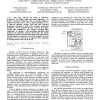Free Online Productivity Tools
i2Speak
i2Symbol
i2OCR
iTex2Img
iWeb2Print
iWeb2Shot
i2Type
iPdf2Split
iPdf2Merge
i2Bopomofo
i2Arabic
i2Style
i2Image
i2PDF
iLatex2Rtf
Sci2ools
ICCAD
2007
IEEE
2007
IEEE
A design flow dedicated to multi-mode architectures for DSP applications
This paper addresses the design of multi-mode architectures for digital signal processing applications. We present a dedicated design flow and its associated high-level synthesis tool, named GAUT. Given a unified description of a set of time-wise mutually exclusive tasks and their associated throughput constraints, a single RTL hardware architecture optimized in area is generated. In order to reduce the register, steering logic (multiplexers) and controller (decoding logic) complexities, we propose a joint-scheduling algorithm which maximizes the similarities between control steps and specific binding approaches for both functional units and storage elements which maximize the similarities between the datapaths. We show through a set of test cases that our approach offers significant area saving relative to the state-of-the-art.
Associated Throughput Constraints | Digital Signal Processing | Hardware | ICCAD 2007 | Single Rtl Hardware |
| Added | 16 Aug 2010 |
| Updated | 16 Aug 2010 |
| Type | Conference |
| Year | 2007 |
| Where | ICCAD |
| Authors | Cyrille Chavet, Caaliph Andriamisaina, Philippe Coussy, Emmanuel Casseau, Emmanuel Juin, Pascal Urard, Eric Martin |
Comments (0)

